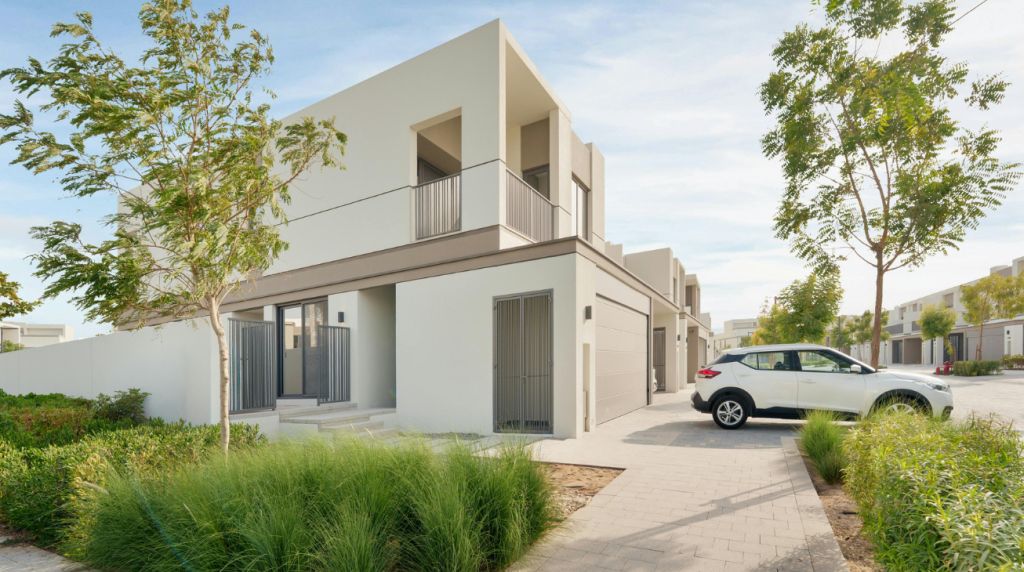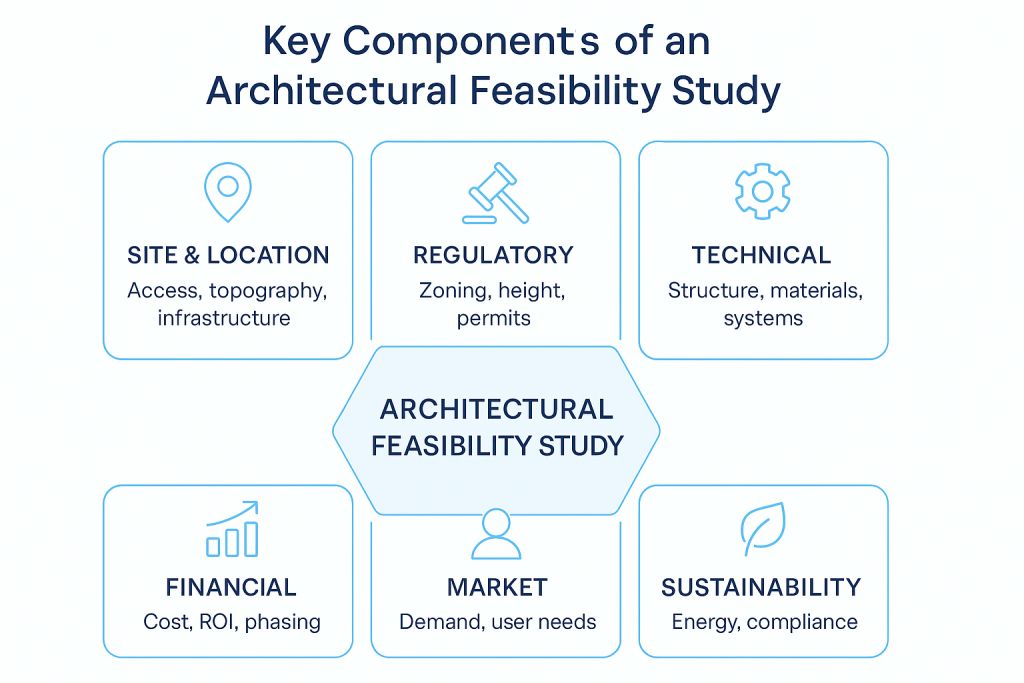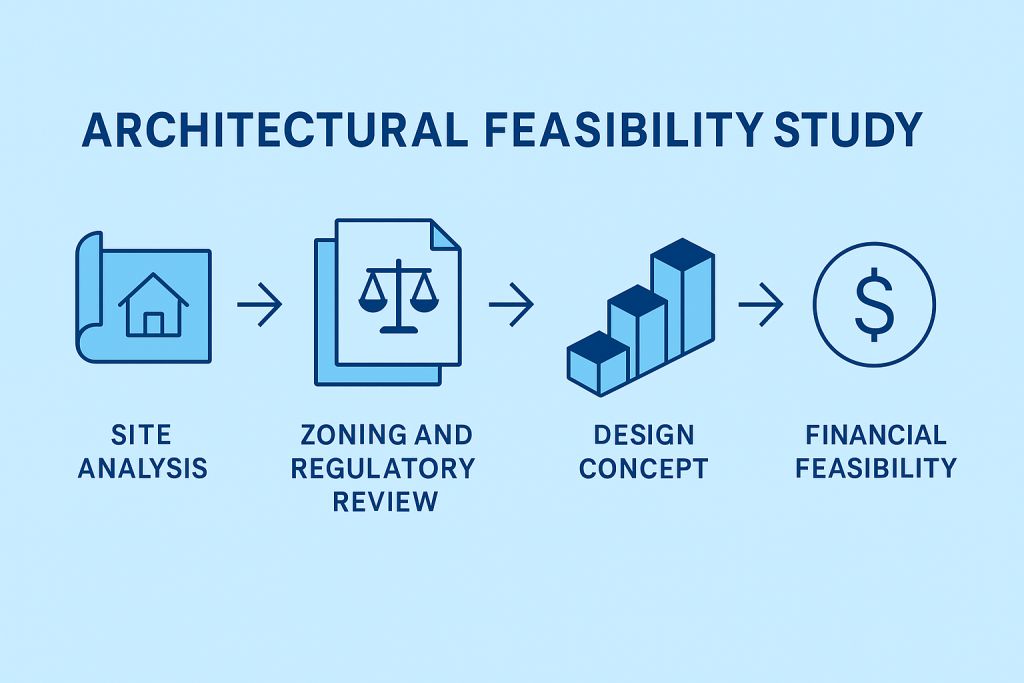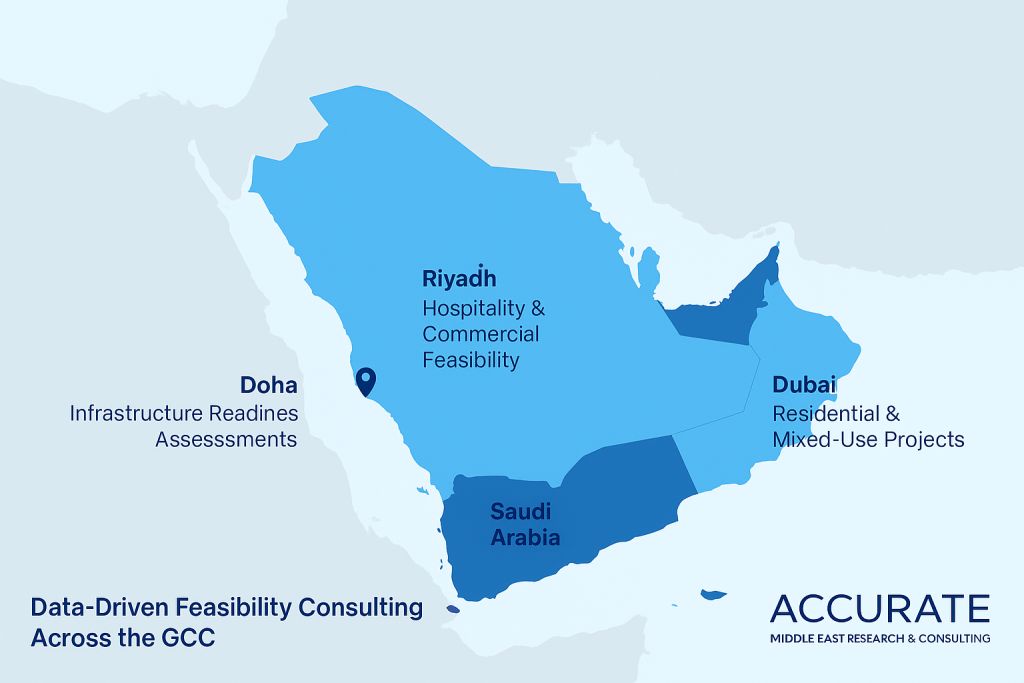Last Updated: 26 October 2025
Before a single line is drawn or a foundation is poured, every successful real estate or construction project begins with one essential step — the architectural feasibility study.
In a region like the GCC, where land values are high, regulations are complex, and development speed defines competitiveness, the right feasibility study is not just technical documentation — it’s a strategic business decision.
At Accurate Middle East Research & Consulting, we prepared this guide to help investors, developers, and business owners understand what an architectural feasibility study includes, why it’s critical in the UAE and Saudi Arabia, and how our consulting team can help you turn an idea into a viable, compliant, and profitable project.

Architectural Feasibility Study: Step-by-Step Guide for Developers in the UAE & GCC
Why an Architectural Feasibility Study is Essential Before You Build
Launching a building project without professional feasibility validation is like sailing without navigation. A design may be ambitious, but the question is — can it actually be built, approved, and sustained?
An architectural feasibility study determines precisely that. It answers whether your concept makes sense technically, financially, and legally within the framework of local regulations and site constraints.
In the UAE and KSA, where planning authorities, environmental codes, and zoning regulations vary across emirates and municipalities, a proper study helps you:
- Evaluate if your project fits on the site and complies with planning rules.
- Understand cost implications and construction limitations early.
- Avoid expensive redesigns or delays after submission.
- Present your vision credibly to investors, authorities, or partners.
A well-prepared feasibility study transforms your idea from a sketch into a decision-ready investment concept.
What an Architectural Feasibility Study Includes
A comprehensive feasibility report combines technical analysis, business intelligence, and regulatory insight. At Accurate Middle East, we align all three dimensions to help decision-makers plan with confidence.
1. Site and Location Analysis
The study begins with an in-depth review of your plot or proposed site — size, topography, accessibility, available infrastructure, and environmental context. We assess visibility, orientation, and land use potential to ensure your design responds to real-world conditions.
In the UAE, for example, understanding access to utilities and road networks can determine up to 15% of the project’s cost structure.
2. Regulatory and Zoning Review
Every emirate and Saudi region follows its own planning framework. We analyze zoning, height limits, setback requirements, floor area ratios, parking norms, and fire & sustainability codes — clarifying what can (and cannot) be approved.
This stage protects developers from the risk of designing something that violates municipal guidelines or building codes — one of the most common and costly mistakes we see among new entrants.
3. Technical and Structural Constraints
Our consultants evaluate terrain, load-bearing conditions, soil and climate factors, and compatibility with intended materials and systems. For projects involving retrofits or vertical extensions, structural capacity and service integration are tested at concept level to avoid surprises later.
4. Financial and Cost-Benefit Analysis
The technical data is translated into financial projections — construction cost ranges, material and labor estimates, potential revenues (for commercial or hospitality projects), and expected ROI.
This financial modeling converts your architectural idea into an investment-ready proposition. It identifies the break-even point, and helps you plan your funding and phasing strategy before committing to design or tendering.
5. Market Demand and Functional Feasibility
Beyond construction, we test market viability — will your concept attract tenants, buyers, or users? For instance, a mixed-use tower in Dubai Marina requires different design logic than a mid-range residential complex in Sharjah or an office development in Riyadh.
We combine architectural feasibility with market analysis to ensure that your space program matches demand.
6. Sustainability and Risk Considerations
Environmental impact, building orientation, energy consumption, and water efficiency are increasingly central to approvals in the GCC.
Our team identifies sustainability opportunities that not only meet local standards (Estidama, Al Sa’fat, LEED) but also improve long-term operating efficiency.

Architectural Feasibility Study: Step-by-Step Guide for Developers in the UAE & GCC
Typical Process and Timeline of an Architectural Feasibility Study
At Accurate Middle East, we use a structured four-phase approach that integrates architectural, economic, and regulatory review.
| Phase | Key Activities | Typical Duration |
| 1. Project Briefing & Scoping | Understanding project vision, function, and client objectives. | 2–3 days |
| 2. Data Collection & Site Analysis | Gathering cadastral maps, surveys, and regulatory data. | 1–2 weeks |
| 3. Technical & Financial Assessment | Developing concept models, cost estimates, and market linkages. | 2–3 weeks |
| 4. Report & Recommendations | Delivering decision-ready document with visuals and financial summary. | 1 week |
Average total timeline: 6-10 weeks depending on project scale.
The result — a professional feasibility dossier ready for internal approval or submission to investors, architects, and authorities.
Cost and Value: Feasibility Study Architecture Cost in the UAE & Saudi Arabia?
The feasibility study architecture cost depends on several variables — the project’s size, land condition, and the level of technical depth required by investors or regulators. In the UAE, most architectural feasibility assessments start around AED 10,000 for compact commercial sites and can reach AED 60,000 + for complex hospitality or multi-tower developments. What matters most is not the price, but the precision: a professionally executed feasibility report can prevent redesign costs, delays, and permit issues that often exceed the initial study budget many times over. Accurate Middle East provides transparent pricing and clear deliverables, ensuring each feasibility package delivers measurable value from the first planning stage.
Fees depend on project size, complexity, and required analysis depth, but on average:
| Type of Project | Typical Range (AED) | Typical Range (SAR) |
| Small commercial / retail plot | 15,000 – 25,000 | 17,000 – 27,000 |
| Medium residential / mixed-use | 25,000 – 35,000 | 27,000 – 37,000 |
| Large development / hospitality | 40,000 – 65,000 | 43,000 – 70,000 |
While these numbers are indicative, the value lies in the precision of insight.
A feasibility study can prevent redesigns or compliance issues that cost ten times more than the study itself.
It gives you an early go/no-go decision — saving months of effort and thousands of dirhams.
Why Hire a Specialized Consulting Firm for Feasibility Studies
Architects and developers often prepare in-house feasibility drafts, but these usually miss the multidisciplinary depth required for decision-making in GCC markets.
A consulting firm like Accurate Middle East brings three dimensions of expertise together:
- Market Intelligence: Access to proprietary databases, regional benchmarks, and real transaction data as well as customized market research.
- Regulatory Knowledge: Experience navigating municipal, free zone, and master-developer requirements.
- Financial Precision: Feasibility modeling aligned with investor expectations and funding mechanisms.
We are not a design firm — we are your strategic advisory partner, translating architectural concepts into viable investments.
Our clients include developers, architects, contractors, and investors who rely on us to provide unbiased feasibility assessments before committing to land purchase, design competitions, or tenders.

Architectural Feasibility Study: Step-by-Step Guide for Developers in the UAE & GCC
Architectural Feasibility Study Example: How Early Analysis Shapes Real Projects
A well-structured architectural feasibility study example demonstrates how critical decisions are made before any design work begins. For instance, when evaluating a new residential or mixed-use plot in Dubai or Riyadh, the feasibility process identifies regulatory limits, site constraints, and cost thresholds that shape every architectural decision. At Accurate Middle East, we treat each study as an applied model — combining site analysis, zoning assessment, and financial modeling — so that investors and architects clearly see what is possible within budget and regulation. This evidence-based approach eliminates uncertainty, allowing stakeholders to move forward confidently with design development and funding discussions. To request examples of feasibility studies in your industry, please reach out to us through email or Whatsapp.
Case Example: Mixed-Use Development, Dubai South
A UAE developer approached us with a preliminary design for a mid-rise mixed-use project combining retail and serviced apartments. Before moving to schematic design, we conducted an architectural feasibility study.
- Site Findings: The plot was partially constrained by setback and height regulations under Dubai South’s zoning.
- Outcome: We proposed an alternative configuration — shifting the retail footprint, reducing parking demand through shared-use logic, and optimizing GFA utilization.
- Result: The redesign increased buildable area by 9% and reduced construction cost per sqm by 11%, maintaining compliance and improving yield.
This case highlights how architectural feasibility is not just compliance — it’s optimization.
Case Example: Hospitality Project in Riyadh
A hospitality investor planning a 4-star business hotel engaged Accurate ME to evaluate whether the chosen site near King Abdullah Financial District could support the concept.
Our team assessed:
- Site accessibility and visibility from main roads.
- Construction cost benchmarks.
- Market performance of similar hotels.
- Compliance with Riyadh Municipality’s hospitality zoning.
Findings: Demand supported the concept, but parking and access would require design modification.
Outcome: The project proceeded after feasibility adjustments, later securing investors under a revised budget model — fully supported by our financial and regulatory study.
Architectural Feasibility Study vs. Full Feasibility Study
Clients often ask about the difference between an architectural feasibility study and a comprehensive business feasibility study.
- The architectural feasibility focuses on site potential, design constraints, and regulatory viability.
- A full feasibility study goes further — incorporating market demand analysis, revenue projections, and full financial modeling.
At Accurate ME, we often combine both in one engagement, so you receive a single integrated document covering design, market, and investment perspectives.
This approach is especially valuable for mixed-use developments, hospitality, healthcare, or education projects — where design decisions and financial outcomes are inseparable.

Architectural Feasibility Study: Step-by-Step Guide for Developers in the UAE & GCC
Why Accurate Middle East
With offices in Dubai and Riyadh, Accurate Middle East Research & Consulting provides end-to-end advisory services — from market research and feasibility studies to business planning and investor presentations.
What sets us apart:
- Deep familiarity with UAE and Saudi building codes, licensing procedures, and development frameworks.
- Expertise across residential, commercial, hospitality, healthcare, and industrial projects.
- Proven ability to deliver decision-ready documentation within 10–15 business days.
- A dedicated network of architectural and financial professionals who combine design logic with commercial intelligence.
When you order our feasibility services, you receive not only numbers and drawings — but a strategic roadmap that shows how to move from idea to approval with confidence.
How to Get Started
If you’re planning a new development, expansion, or investment project, talk to us before you design.
Our consultants will guide you through the regulatory landscape, assess your site, and prepare an architectural feasibility study tailored to your objectives.
You’ll receive:
- A detailed proposal within 24 hours,
- A free 30-minute consultation with our senior consultant, and
- Option to request a sample feasibility report to understand structure and content.
For inquiries, consultations, or customized proposals, contact Accurate Middle East directly via WhatsApp at or call us in the UAE at +971 50 599 5603.
You can also request a callback or schedule your consultation by clicking the button below.
If you prefer to brief us directly, simply fill in our short client form — and receive a personalized proposal within 24 hours.
We’re here to help you evaluate, plan, and build with confidence across the UAE, Saudi Arabia, and the GCC.
 | |
Author: | |
| Ekaterina Novikova Senior Researcher | |
| 15+ years of experience in feasibility studies, market studies, business intelligence in the UAE, KSA, and GCC. Senior Researcher at Accurate Middle East Research and Consulting in Dubai. |
Related Article: Construction Project Feasibility Study in the UAE
Turning a concept into a built reality requires more than design approval — it demands financial clarity, technical precision, and regulatory alignment. Our Construction Project Feasibility Study in the UAE article explores how Accurate Middle East helps developers and investors evaluate project costs, timelines, and compliance before breaking ground. It outlines the essential steps of pre-construction due diligence and how early-stage feasibility can secure funding, minimize risks, and accelerate approvals.
👉 Explore Construction Project Feasibility Study in the UAE →



